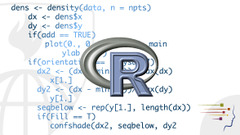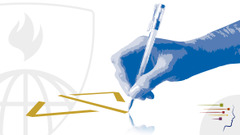Courses tagged with "Nutrition" (421)
This class will give you an introduction to the fundamentals of programming languages. Key concepts include how to specify and process valid strings, sentences and program structures.
Investigate the basic concepts behind programming languages, with an emphasis on the techniques and benefits of functional programming. Use the programming languages ML, Racket, and Ruby to learn how the pieces of a language fit together to create more than the sum of the parts. Gain new software skills and the concepts needed to learn new languages on your own.
6.821 teaches the principles of functional, imperative, and logic programming languages. Topics covered include: meta-circular interpreters, semantics (operational and denotational), type systems (polymorphism, inference, and abstract types), object oriented programming, modules, and multiprocessing. The course involves substantial programming assignments and problem sets as well as a significant amount of reading. The course uses the Scheme+ programming language for all of its assignments.
Introduction to the design and implementation of applications for handheld systems, such as smartphones and tablets, running the Android Platform.
In this subject, we consider two basic topics in cellular biophysics, posed here as questions:
- Which molecules are transported across cellular membranes, and what are the mechanisms of transport? How do cells maintain their compositions, volume, and membrane potential?
- How are potentials generated across the membranes of cells? What do these potentials do?
Although the questions posed are fundamentally biological questions, the methods for answering these questions are inherently multidisciplinary. As we will see throughout the course, the role of mathematical models is to express concepts precisely enough that precise conclusions can be drawn. In connection with all the topics covered, we will consider both theory and experiment. For the student, the educational value of examining the interplay between theory and experiment transcends the value of the specific knowledge gained in the subject matter.
This course is jointly offered through four departments, available to both undergraduates and graduates.
In this subject, we consider two basic topics in cellular biophysics, posed here as questions:
- Which molecules are transported across cellular membranes, and what are the mechanisms of transport? How do cells maintain their compositions, volume, and membrane potential?
- How are potentials generated across the membranes of cells? What do these potentials do?
Although the questions posed are fundamentally biological questions, the methods for answering these questions are inherently multidisciplinary. As we will see throughout the course, the role of mathematical models is to express concepts precisely enough that precise conclusions can be drawn. In connection with all the topics covered, we will consider both theory and experiment. For the student, the educational value of examining the interplay between theory and experiment transcends the value of the specific knowledge gained in the subject matter.
This course is jointly offered through four departments, available to both undergraduates and graduates.
This course is an introduction to quantum computational complexity theory, the study of the fundamental capabilities and limitations of quantum computers. Topics include complexity classes, lower bounds, communication complexity, proofs, advice, and interactive proof systems in the quantum world. The objective is to bring students to the research frontier.
This course provides an introduction to the theory and practice of quantum computation. Topics covered include: physics of information processing, quantum logic, quantum algorithms including Shor's factoring algorithm and Grover's search algorithm, quantum error correction, quantum communication, and cryptography.
This is an advanced graduate course on quantum computation and quantum information, for which prior knowledge of quantum mechanics is required. Topics include quantum computation, advanced quantum error correction codes, fault tolerance, quantum algorithms beyond factoring, properties of quantum entanglement, and quantum protocols and communication complexity.
6.453 Quantum Optical Communication is one of a collection of MIT classes that deals with aspects of an emerging field known as quantum information science. This course covers Quantum Optics, Single-Mode and Two-Mode Quantum Systems, Multi-Mode Quantum Systems, Nonlinear Optics, and Quantum System Theory.
Learn how to program in R and how to use R for effective data analysis. This is the second course in the Johns Hopkins Data Science Specialization.
This course examines how randomization can be used to make algorithms simpler and more efficient via random sampling, random selection of witnesses, symmetry breaking, and Markov chains. Topics covered include: randomized computation; data structures (hash tables, skip lists); graph algorithms (minimum spanning trees, shortest paths, minimum cuts); geometric algorithms (convex hulls, linear programming in fixed or arbitrary dimension); approximate counting; parallel algorithms; online algorithms; derandomization techniques; and tools for probabilistic analysis of algorithms.
In keeping with the tradition of the last twenty-some years, the Readings in Optimization seminar will focus on an advanced topic of interest to a portion of the MIT optimization community: randomized methods for deterministic optimization. In contrast to conventional optimization algorithms whose iterates are computed and analyzed deterministically, randomized methods rely on stochastic processes and random number/vector generation as part of the algorithm and/or its analysis. In the seminar, we will study some very recent papers on this topic, many by MIT faculty, as well as some older papers from the existing literature that are only now receiving attention.
This course explores the detection and measurement of radio and optical signals encountered in communications, astronomy, remote sensing, instrumentation, and radar. Topics covered include: statistical analysis of signal processing systems, including radiometers, spectrometers, interferometers, and digital correlation systems; matched filters and ambiguity functions; communications channel performance; measurement of random electromagnetic fields, angular filtering properties of antennas, interferometers, and aperture synthesis systems; and radiative transfer and parameter estimation.
Effective social media policy protects an organization from risk at the same time as it enables employees to develop more effective ways to accomplish work. Driving the implementation of social media policy is a great way for Human Resources (HR) and business leaders to demonstrate value with executive leadership.
Learn the concepts and tools behind reporting modern data analyses in a reproducible manner. This is the fifth course in the Johns Hopkins Data Science Specialization.
Investigate the flexibility and power of project-oriented computational analysis, and enhance communication of information by creating visual representations of scientific data.
In this course, you'll learn what every citizen should know about the security risks--and future potential — of electronic voting and Internet voting.
This course covers a number of advanced "selected topics" in the field of cryptography. The first part of the course tackles the foundational question of how to define security of cryptographic protocols in a way that is appropriate for modern computer networks, and how to construct protocols that satisfy these security definitions. For this purpose, the framework of "universally composable security" is studied and used. The second part of the course concentrates on the many challenges involved in building secure electronic voting systems, from both theoretical and practical points of view. In the third part, an introduction to cryptographic constructions based on bilinear pairings is given.
6.780 covers statistical modeling and the control of semiconductor fabrication processes and plants. Topics covered include: design of experiments, response surface modeling, and process optimization; defect and parametric yield modeling; process/device/circuit yield optimization; monitoring, diagnosis, and feedback control of equipment and processes; and analysis and scheduling of semiconductor manufacturing operations.
Trusted paper writing service WriteMyPaper.Today will write the papers of any difficulty.


















